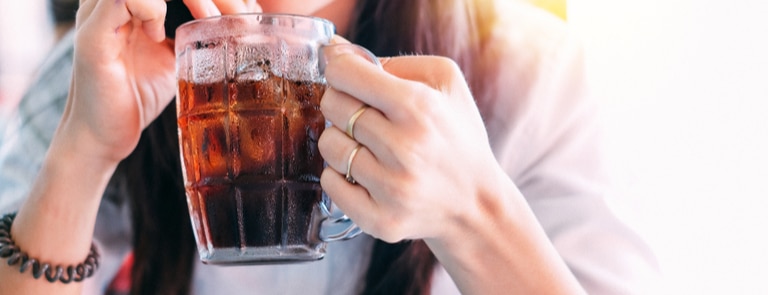10% off £35
14 of the best foods & supplements to boost your energy while fasting
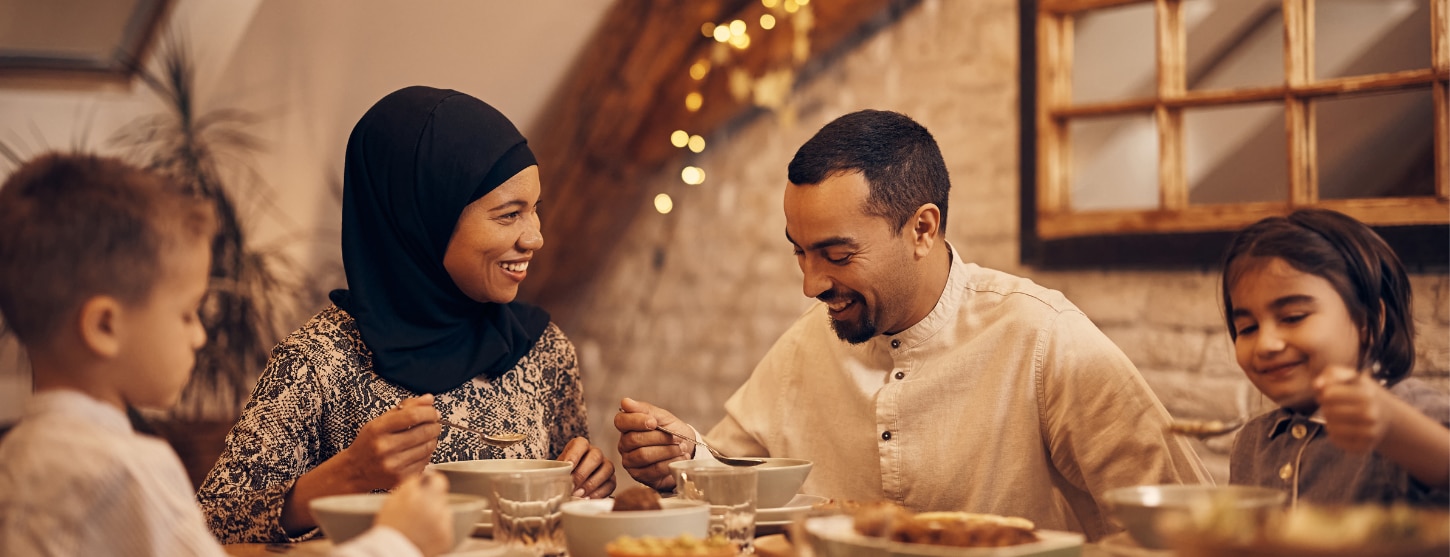
As we approach Ramadan, there’s plenty to consider when it comes to our physical, mental, and spiritual health.
During this holy month, Muslims worldwide fast during daylight hours.
While fasting offers a time to strengthen religious connection, it's important to think about the food and drink you choose at Suhoor and Iftar to help keep your body nourished and full of energy.
We’ve gathered some of the top foods, drinks, and supplements to support you when breaking fast, as recommended by two of our Muslim Regional Managers, Ayaz Ali and Sean Quane.
If you practice Halal as a Muslim, be sure to check all products individually for certification.
You’ll also find Ayaz and Sean’s introduction to Ramadan below!
Ramadan Introduction
When is Ramadan this year?
In 2024, Ramadan is expected to begin on the evening of Monday 11th March and continue until Tuesday 9th April.
Eid al-Fitr is expected to last from the evening of Tuesday 9th April to Wednesday 10th April, subject to the sighting of the new moon.
I’m looking for something... …to help me stay energised
1. Nuts
1. Nuts
Your Suhoor can affect your energy levels for the rest of the day – so it’s crucial to choose a meal that’s filling without being overindulgent and provides lots of slow-releasing sources of energy.
Nuts are high in protein, dietary fibre, and healthy fats, making them a great option for sustained energy throughout your fast. 1
They’re a source of soluble fibre, which slows the rate at which sugar absorbs into the bloodstream. 2 This helps to prevent blood sugar spikes, which can leave us “crashing” in the day.
Plus, they’re versatile! Try peanut butter and sliced banana on wholemeal toast for a combination of slow-releasing fibre and complex carbohydrates.
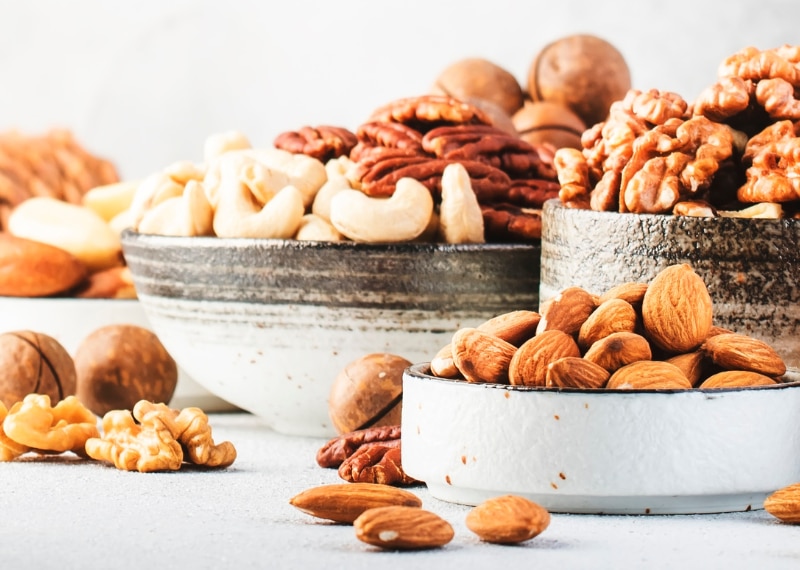

2. Superfoods
Although healthy fats, complex carbs, fibre, and protein are the best ways to stay energised through your fast, it’s equally as important to get all the vitamins and nutrients you need.
Deficiencies in nutrients like vitamin C and iron can leave you feeling tired.3 4 We know that superfoods are packed with nutrition, so why not blend a few of your favourites into a smoothie?
Make your own smoothies where you can, as supermarket versions may be high in added sugar and could contribute to a midday energy crash.
- Berries: blueberries, strawberries, and raspberries are all high in antioxidants, which can help keep your heart healthy 5
- Citrus fruits: famous for their high vitamin C content 6
- Avocado: provides healthy fats and fibre – plus gives smoothies a thick, creamy texture 7
- Spinach or kale: great sources of vitamins C, K, and plant-based iron 8 You can also bulk up your smoothie with:
- Oats: for a source of complex carbohydrates and dietary fibre 9
- Seeds: like chia seeds, which are high in fibre, protein, and iron 10
- Your choice of milk: to provide fat to help fuel your body through the day for an energy-boosting Suhoor – especially if you’re not ready for a full plate of food.
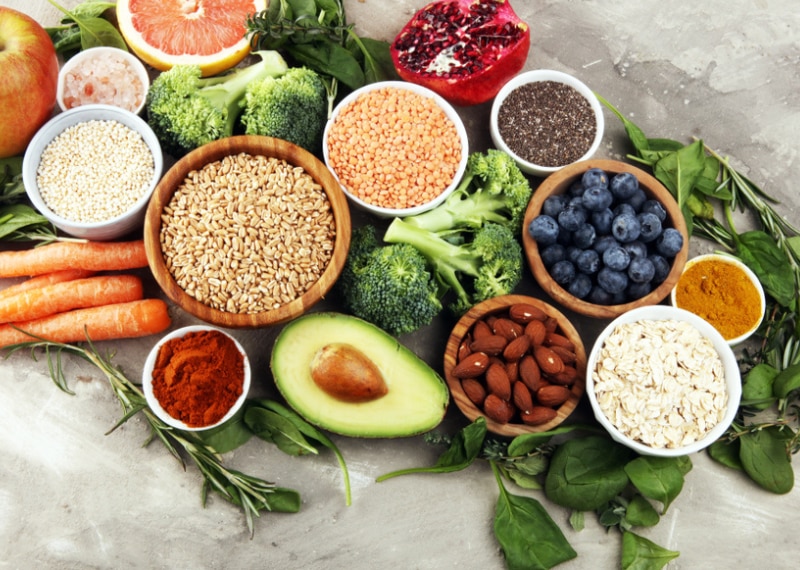

...to keep me full for longer
...to keep me full for longer
3. Porridge oats
Oats are full of complex carbohydrates, which maintain a slow and steady source of energy and can help you stay full throughout your fast. They’re digested slowly in the bloodstream, avoiding the “crash” you get with simple carbs like white bread or crisps. 11
They’re also high in fibre, which is good for your gut: it helps support digestion 11
Oats are a great option for a filling Suhoor – but they’re not limited to porridge. As long as they’re low in refined sugar (homemade is best), overnight oats, granola, flapjacks, and protein balls could all work if you fancy a change.
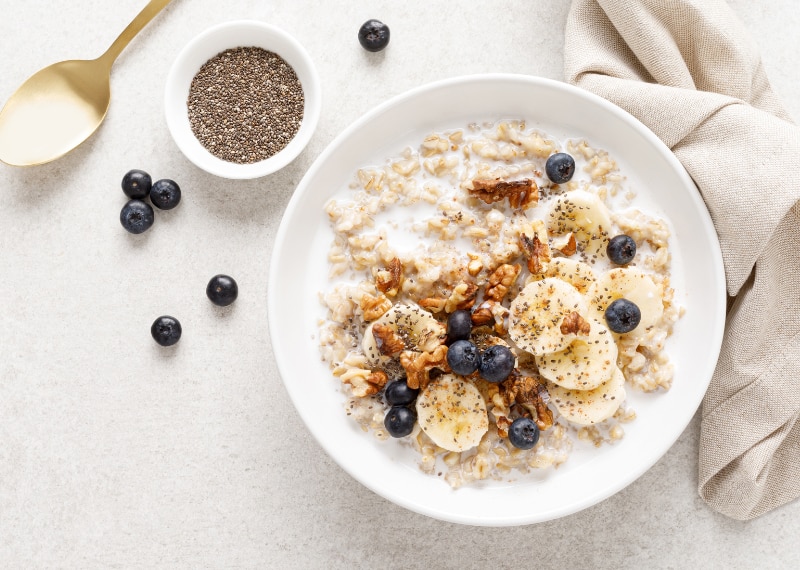

4. Brown rice
4. Brown rice
As well as keeping you full, a diet high in fibre could reduce risk of heart disease.12
Brown rice is another rich source of dietary fibre – perfect if you’d prefer something savoury.
It also contains higher levels of magnesium than white rice, which can help with muscle recovery; particularly important if you’re staying active while fasting. 13
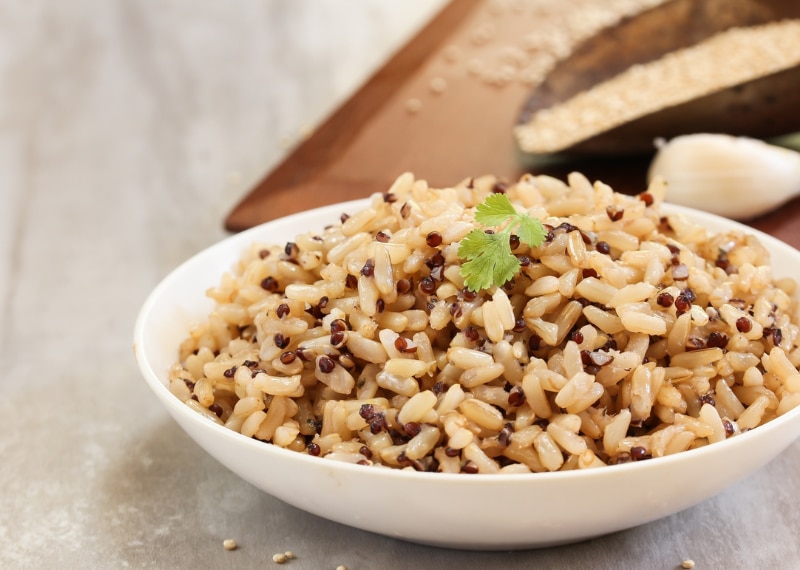

... to drink
... to drink
5. Coconut water
You might have heard that coconut water’s as effective as an energy drink. Is this a myth? Well, pretty much – but it does have some great benefits.
It's mostly made of water and is a good natural source of minerals, including potassium. This makes coconut water a great drink for before and after a fast. ¹⁴
You’ll also find other electrolyte minerals like magnesium, calcium, and sodium. ¹⁴ Electrolytes are salts and minerals found in our blood which help to keep us hydrated and use our muscles normally. ¹⁵
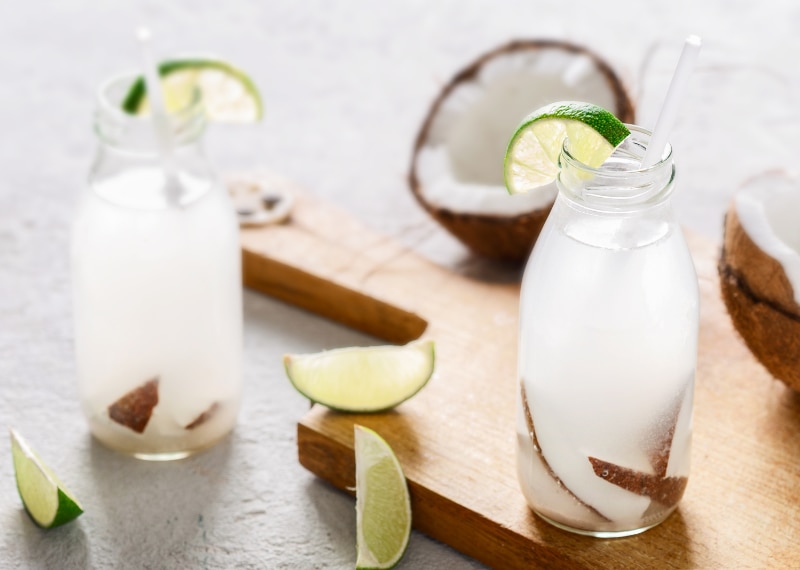

6. Aloe vera juice
6. Aloe vera juice
Aloe vera was called the “plant of immortality” by the Ancient Egyptians – and while it won’t quite live up to that hype, it’s got some goodness to offer. It’s full of vitamins A, C, and E – all antioxidants, which are important to get in your daily diet! ¹⁶
Aloe vera juice may also act as a laxative, since early research suggests it stimulates water flow into the intestines and makes stools easier to pass. ¹⁶
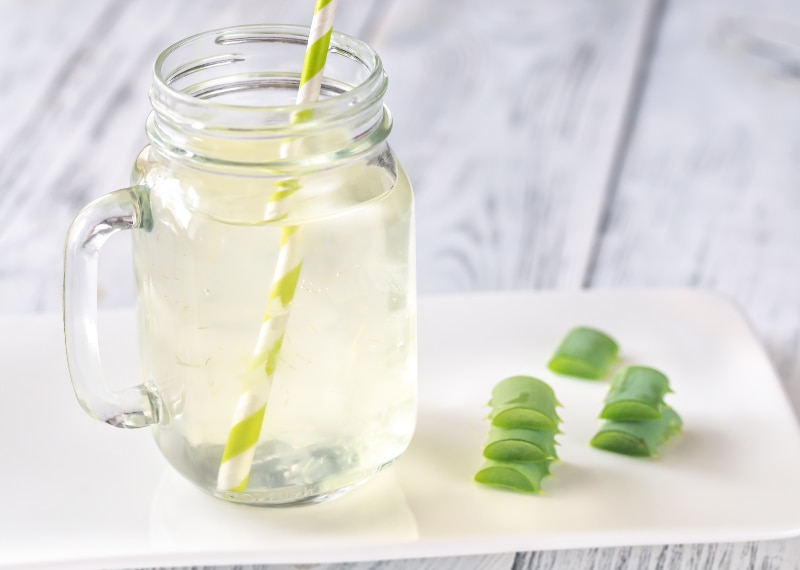

...for when I’m active
7. Nutritionally complete food
If you can’t face a large meal for your Suhoor, or you need something quick, nutritionally complete food might help you out.
As the name suggests, it provides all the nutrients you'd find in a complete meal; just in an easy drink form.
It’s high in protein and fibre to help maintain slow-releasing energy throughout the day, and provides all the carbohydrates, fats, vitamins, and minerals your body needs to stay healthy. Plus, our range of nutritionally complete foods come in a range of flavours – the only decision you’ll need to make!
8. Casein protein
Cow’s milk contains two different proteins: whey and casein. You might have already heard of whey protein, but slow-digesting casein actually makes up 80% of the total proteins in milk. 17
Protein is renowned for its ability to:
- Help your muscles to grow and repair 18
- Help you stay fuller for longer; it takes more energy to digest than refined carbohydrates like white bread, white rice, and cakes. Don’t worry – this doesn’t mean it uses up your energy! It provides a source that your body uses more gradually through the day. 19
According to the British Nutrition Foundation, most people need about 0.75g of protein per kilogram of their body weight. So, someone weighing 75kg would need about 56g of protein every day.20
Just like nutritionally complete food, it’s an option to consider if you’re choosing to exercise throughout Ramadan, or if your job or your lifestyle means you’re active through the day.
9. Prune juice
9. Prune juice
Prunes are famous for their fibre content! Fibre helps keep your digestion moving along, which is particularly important if you’re prone to an upset stomach (particularly constipation) during Ramadan. This is common as your eating times and habits change and you don’t get any water throughout the day.
Prune juice doesn’t contain quite as much fibre as dried prunes, but it’s a good way to drink your fibre intake.
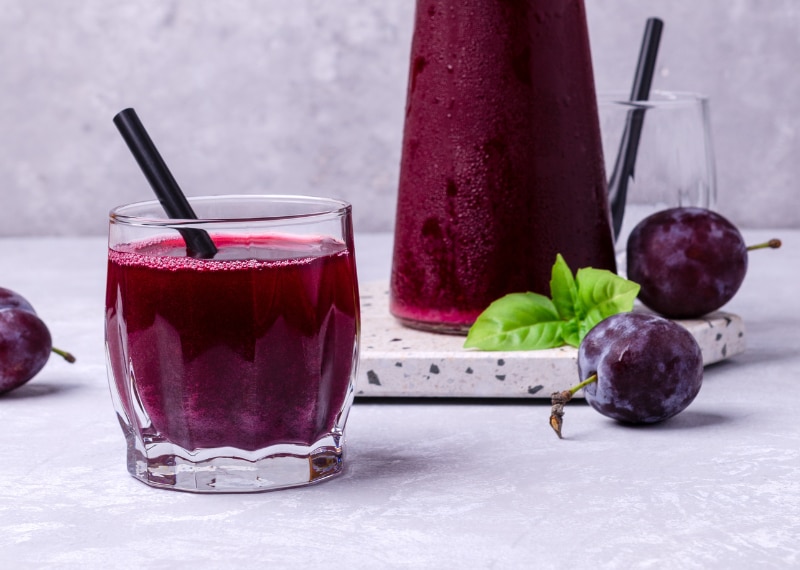

It’s also a source of sorbitol, a type of sugar alcohol. Though it’s an alcohol, sorbitol doesn’t contain ethanol, the compound that can make you drunk.
Sorbitol draws water into the gut, which can make stools softer and encourage bowel movements. ²¹
Plus, it’s rich in iron – make sure you’re not deficient, as this can make you feel tired and weak.
10. Activated charcoal
Feeling gassy? Charcoal might not be your first thought...but it’s a natural absorbent and can soak up excess gas in your gut.22
You can find it added to a range of food and drinks, but activated charcoal tablets are likely your best choice if you’re using it to help with flatulence and bloating.
It’s best to talk to your GP before taking charcoal. Always check with them if you have any medical conditions (particularly involving your digestive system) or if you’re on any medications, because of its absorbent qualities.
...to top up my everyday health
...to top up my everyday health
11. Manuka honey
This unique honey comes from bees who visit the Manuka bush, only found in New Zealand and Australia.
Genuine manuka honey has antibacterial properties, helping you support your general wellbeing. Look out for the MGO rating on the packaging; the higher the number, the more potent the antibacterial properties.
Manuka honey also has a higher ratio of fructose to glucose than refined sugar, meaning there’s less of a spike in your blood glucose levels.23 And there’s less carbohydrates and sugar and more protein than regular honey! 24 Stir some into tea, drizzle onto desserts, or enjoy straight from the spoon.
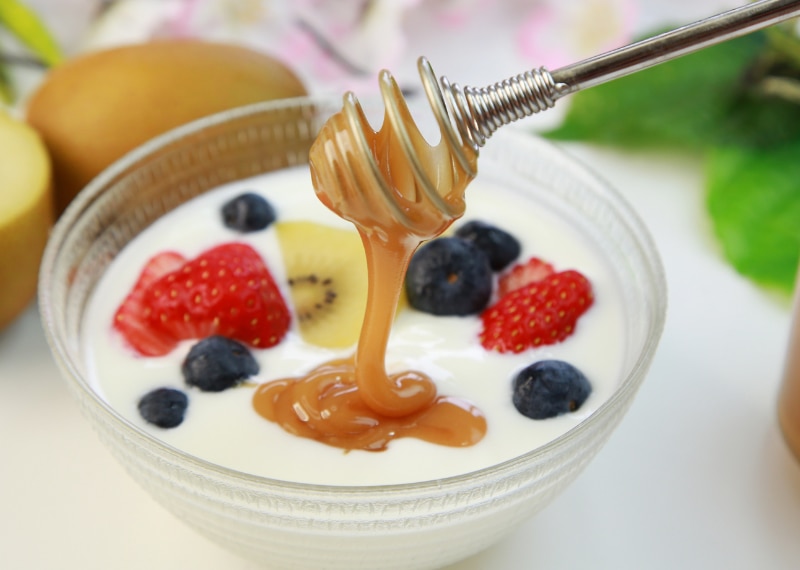

12. Multivitamins
Vitamins keep you functioning normally and full of energy at any time – so it’s vital to make sure you’re getting what you need during Ramadan.
While you should always aim to get your vitamins and minerals through your diet, a multivitamin could be an easy way to make sure you’re topped up ahead of your fast. Some multivitamins are specially geared towards energy – you might want to look out for:
- B vitamins 25
- Magnesium 26
- Iron 27
- Vitamin C 28
Just be sure you’re not taking any other vitamins separately, as doubling up could be harmful.
...something nourishing for Iftar
“During Ramadan, it’s all about getting together, breaking fast together, meeting your fellow neighbours, your friends, and your family,” Ayaz explains.
“It's a celebration about all the things you’re grateful for. Just being appreciative for the simple things in life: just food, which on a day-to-day basis we take it for granted, don’t we? You eat, you have your lunch, your coffee – but during Ramadan you can’t do that.
And at the end of the day, when it comes to breaking your fast, after hours of fasting you’re so appreciative just for a glass of water.”
13. Dates
13. Dates
Dates are traditionally eaten to break the fast, just as the prophet Mohammed did. As well as their religious significance, they’re rich in fibre like many other dried fruits.
While we know it’s good for long-lasting fullness throughout the day, it’s also wise to get your fibre in during Iftar. By breaking the fast with something fibre-rich, you can satisfy your hunger and then move onto other foods, rather than overeating straight away.
Dates are also packed with nutrients like potassium and magnesium, as well as carotenoids and lignans.29
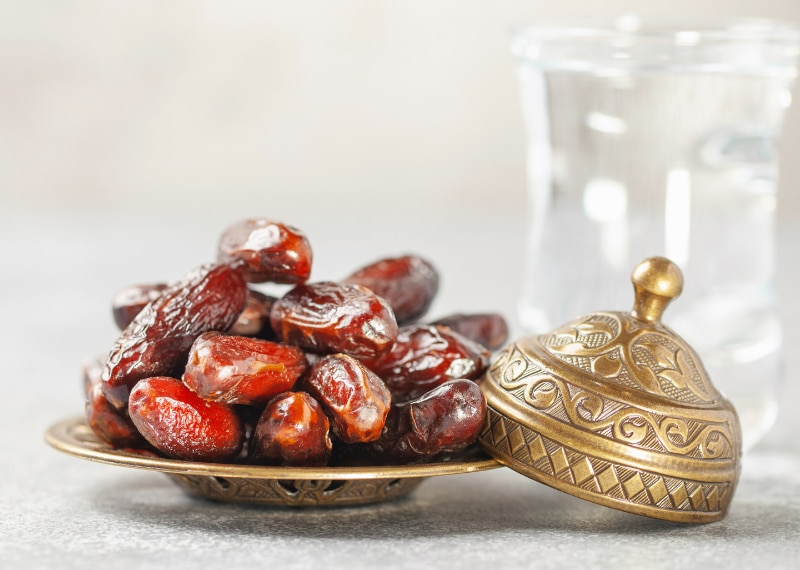

14. Quinoa
14. Quinoa
Quinoa counts as a whole grain, but each tiny piece is actually a seed.30
It boasts about 14g of protein per 100g – and it's a complete protein, meaning it contains all 8 of our essential amino acids. Even better, it’s naturally gluten-free. 30
It’s also a complex carb and high in fibre, which we know by now are great for providing longer-lasting energy. Because of this, it makes a great (and versatile) option for breaking your fast; use it in place of rice or couscous or bulk out a salad.
It’s even possible to make porridge with it, if oats aren’t your thing.
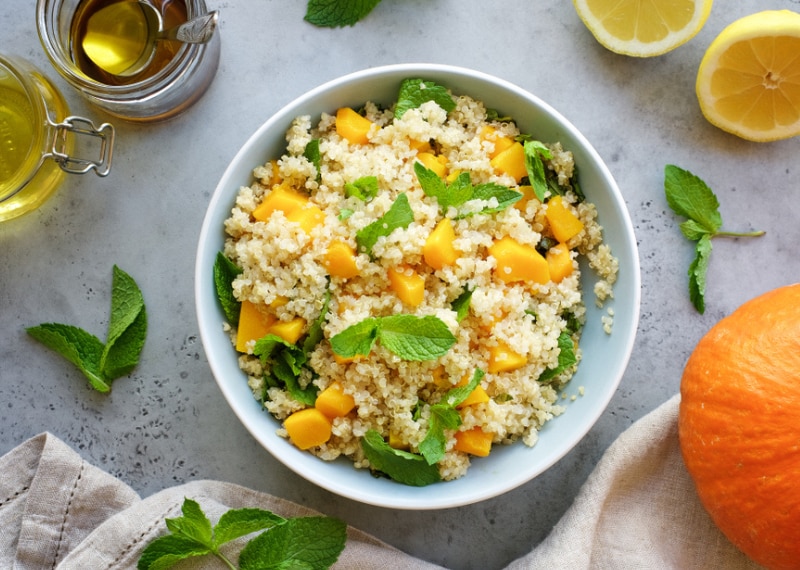

A guide to fasting safely
You are exempt from fasting if you are ill or if you have a medical condition that would make fasting unsafe for you. You are also exempt from fasting if you are menstruating, or if you’re pregnant or breastfeeding and there are concerns about yours or your child’s health.31
The decision to fast is yours, but it’s important to speak to your doctor before deciding to fast to make sure that the risk to your health is not too high, and to find ways to keep your risk as low as possible if it is safe for you to fast.
According to the British Islamic Medical Association, you should stop fasting and seek medical advice if you become ill during Ramadan.32
If you’re observing the fast, you should have at least two meals (Suhoor and Iftar) per day. Try to include a balance of food groups, including: 33
- Fruits and vegetables
- Carbohydrates, like bread, potatoes, and grains
- Milk and dairy foods
- Meat, fish, or alternatives
- Foods containing fat and sugar
Remember to take all the medications you need and continue to attend medical appointments; contact your doctor’s office or hospital if you need to rearrange the time. Speak to your GP if you need to adjust the times or the dosage of your usual medications. 32
The final say
Hopefully this provides some ideas for the best foods to break your fast – whether you’re setting yourself up for the day or celebrating Iftar, you’ll find some nourishing and energising ideas.
“Regardless of your religion, you’re welcome to sit and eat,” says our West One Store Manager, Ahmed Badreldin, in our “Ramadan: Food & Culture” video, “and you wouldn’t feel as though you’re unwelcome or that someone might look at you in a different way because, obviously, it’s all about love. It’s all about sharing, and loving each other.
We’re fasting during Ramadan because we’re meant to feel how other more unfortunate people feel on a daily basis. So this gives us the feeling that we should do our duty. Our purpose in life is to help and support others, regardless of their religion or where they are.
You find that a lot of Muslim communities and charities donate and do charity work to places we don’t even know who for. As long as we’re helping another person or another community, that’s the whole purpose.”
Again, if you practice Halal, be sure to check all products you use individually for certification to make sure they’re suitable for you.
Last updated: 1 March 2024
The advice in this article is for information only and should not replace medical care. Please check with your GP or healthcare professional before trying any supplements, treatments or remedies. Food supplements must not be used as a substitute for a varied and balanced diet and a healthy lifestyle.
- https://www.bhf.org.uk/informationsupport/heart-matters-magazine/nutrition/are-nuts-good-for-you
- https://www.diabetes.org.uk/guide-to-diabetes/enjoy-food/carbohydrates-and-diabetes/fibre-and-diabetes
- https://www.nhs.uk/conditions/scurvy/
- https://www.bda.uk.com/resource/iron-rich-foods-iron-deficiency.html
- https://www.bhf.org.uk/informationsupport/heart-matters-magazine/nutrition/5-a-day/colourful-foods
- https://www.nhs.uk/conditions/vitamins-and-minerals/vitamin-c/
- https://www.bhf.org.uk/informationsupport/heart-matters-magazine/nutrition/ask-the-expert/avocado
- https://www.verywellfit.com/spinach-nutrition-facts-calories-and-health-benefits-4114717
- https://www.bfwh.nhs.uk/wp-content/uploads/2016/04/BDA-Carbs.pdf
- https://www.nutritionvalue.org/Seeds%2C_dried%2C_chia_seeds_nutritional_value.html
- https://www.bfwh.nhs.uk/wp-content/uploads/2016/04/BDA-Carbs.pdf
- https://www.health.harvard.edu/heart-health/eat-more-fiber-rich-foods-to-foster-heart-health
- https://www.verywellfit.com/brown-rice-nutrition-facts-and-health-benefits-4799531
- https://www.verywellfit.com/coconut-water-nutrition-facts-calories-and-health-benefits-4110619
- https://pubmed.ncbi.nlm.nih.gov/7854827/
- https://patient.info/news-and-features/does-aloe-vera-juice-really-help-with-gut-health
- https://www.ncbi.nlm.nih.gov/pmc/articles/PMC2039733/
- https://www.nhs.uk/live-well/eat-well/how-to-eat-a-balanced-diet/eating-a-balanced-diet/
- https://www.health.harvard.edu/blog/extra-protein-is-a-decent-dietary-choice-but-dont-overdo-it-201305016145
- https://www.nutrition.org.uk/healthy-sustainable-diets/protein/?level=Health%20professional
- https://www.sciencedirect.com/science/article/pii/S0261561418300037
- https://pubmed.ncbi.nlm.nih.gov/7015846/
- https://www.ncbi.nlm.nih.gov/pmc/articles/PMC5817209/
- https://www.hollandandbarrett.com/the-health-hub/food-drink/food/manuka-honey/understanding-manuka-honey-label/
- https://www.nhs.uk/conditions/vitamins-and-minerals/vitamin-b/
- https://www.nhs.uk/conditions/vitamins-and-minerals/others/
- https://www.ncbi.nlm.nih.gov/pmc/articles/PMC7019700/
- https://www.ncbi.nlm.nih.gov/pmc/articles/PMC7019700/
- https://www.bbcgoodfood.com/howto/guide/health-benefits-dates
- https://www.hsph.harvard.edu/nutritionsource/food-features/quinoa/
- https://britishima.org/wp-content/uploads/2021/12/Ramadan-Health-Factsheet.pdf
- https://www.bartshealth.nhs.uk/ramadan
- https://www.gov.uk/government/news/healthy-fasting-during-ramadan


